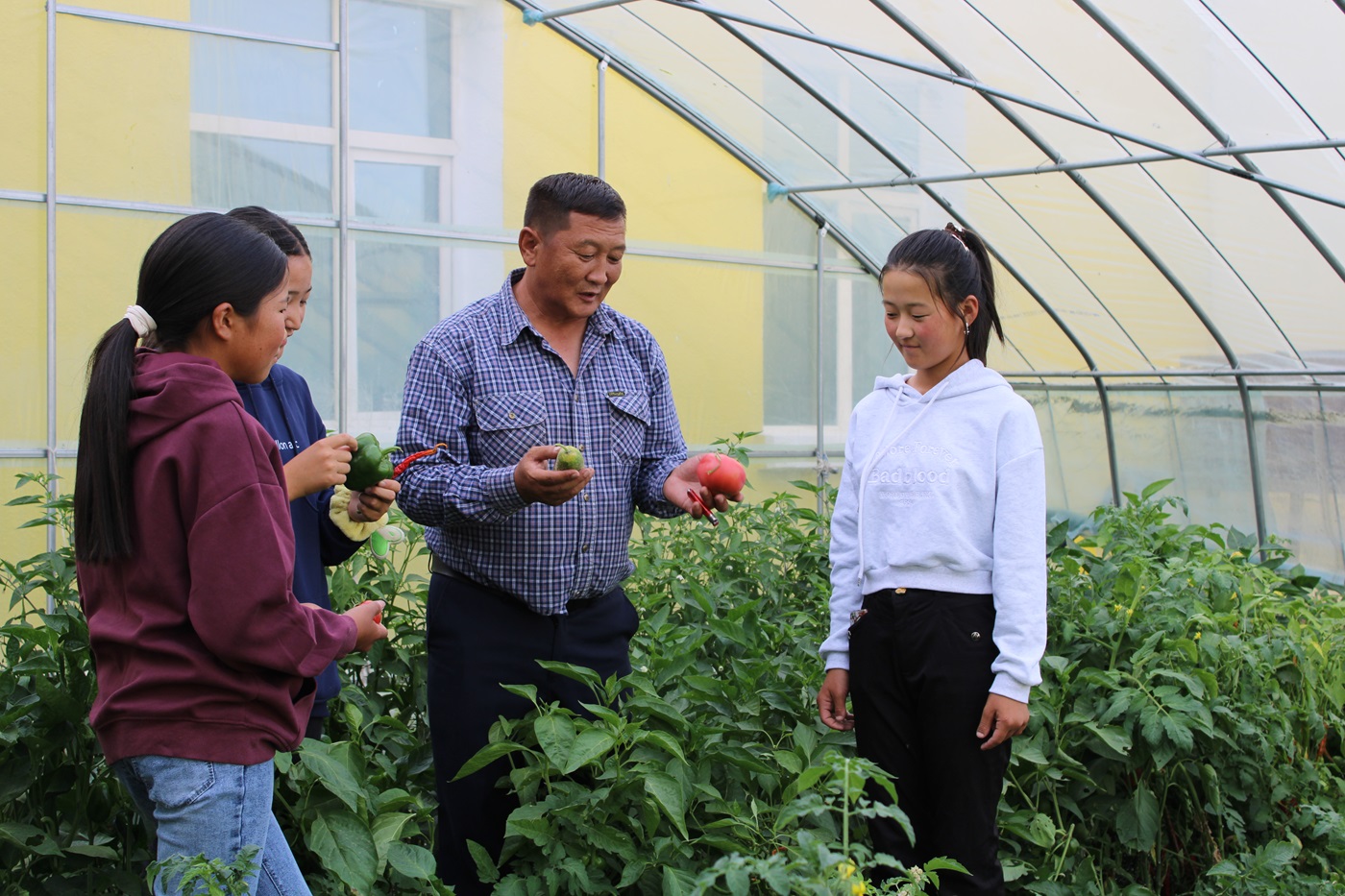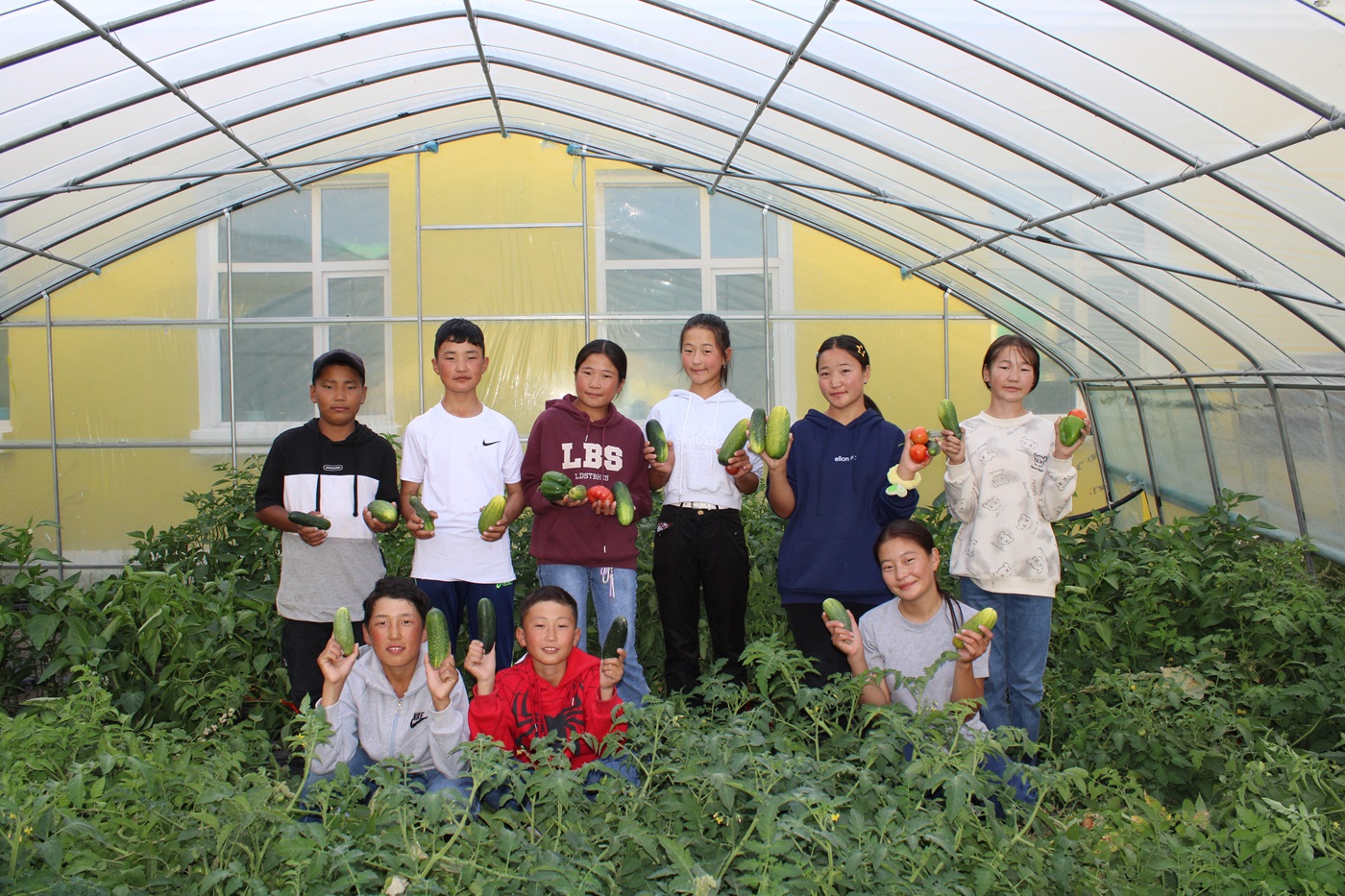Eco School Students Grow Healthy Food
-The goal is to transform into a specialized school that imparts ecological knowledge and strengthens life skills-
Zereg soum in Khovd province faces harsh climate conditions and soil challenges, with gypsum and saline land that makes farming difficult. We want to proudly share the success story of a community that has overcome these challenges, grown healthy vegetables, and provided fresh produce for both the schoolchildren and the people of the soum.
Zereg soum in Khovd province is located 160 km from the provincial center and 1,284 km from the capital city. The soum experiences a harsh climate, with wind speeds ranging from 14 to 55 m/sec, and its gypsum-rich, saline soil makes it unsuitable for farming. (Research Report on the Feasibility of Implementing a School-Based Enterprise, O. Burenjargal, 2021)
Zereg soum School participated in the “School-Based Enterprise” project competition, which was organized among schools in the target soums of five aimags implementing Save the Children’s “Entrepreneurship-Focused Socio-Emotional Skills for the Most Vulnerable Youth in Rural Mongolia” project. The school received 107.5 million MNT in funding for their “Eco Food” project proposal. With this funding, they purchased the necessary equipment and seeds for growing vegetables both in greenhouses and outdoors, and constructed two greenhouses and fences. The local government also provided 4 hectares of land for vegetable cultivation.
The “Eco Food” school-based enterprise is made up of several teams: management, training, marketing and sales, cultivation, external relations, investment, and the student club. Students from the Entrepreneur Club and Eco Club lead these activities, while all teachers and staff at the school actively participate in planting, tending, and harvesting together, while contributing to the project’s tangible results.
B.Anar, an 8th-grade student at Zereg soum General secondary school shared, “Our school has a greenhouse and a vegetable plot where our class works. We clean the vegetable plot by removing the stones, and prepare and plant seedlings in the greenhouse. We take turns watering the plants. It’s amazing to watch a tiny seed, like a dot, grow taller and eventually bear fruit. It’s even better to eat the vegetables we’ve grown right in our dormitory. I’m glad to have learned how to grow vegetables.”

Each teacher looks for opportunities to integrate the activities of the “Eco Food” school-based enterprise into their lesson topics and develops their lesson plans accordingly. Students take the lead in initiating and carrying out activities to promote the enterprise to the public and conduct advocacy efforts. During the summer holidays, the stockkeeper and plumber are primarily responsible for watering and maintaining the fields and greenhouses.
The school initially lacked experience in running such an enterprise. To successfully implement the “Eco Food” school-based enterprise, they received three training sessions from agricultural experts at the “Khugjil” Polytechnic College in Khovd province, with support from Save the Children. These sessions helped enhance their knowledge, methods, and skills in farming. As mentioned earlier, the students at Zereg soum School faced several obstacles in implementing their school-based enterprise, one of which was the extreme weather.
Although one greenhouse was destroyed in a 28 m/s storm in the spring of 2023, 3.1 tons of vegetables were harvested from the remaining greenhouse and 1 hectare of vegetable plot. The harvested produce was used in school lunches and dormitory meals, and was also sold to the people of the soum, generating 5.7 million MNT in revenue.
Every spring, they prepare seeds and seedlings with the help of their students, growing vegetables like peppers, tomatoes, two types of cucumbers, and bok choy in the greenhouse, while cultivating watermelons, potatoes, cabbage, and sea buckthorn in the planting fields. They harvest the crops in September and October, selling them through the school’s sales outlet or via delivery.
As part of the annual “Our School – Herders’ Camp” campaign, held every fall, samples of the harvest are delivered to the bagh center, where herders are introduced to the school’s activities and the vegetables are sold. Parents are happy to purchase healthy vegetables grown with the help of their children. Looking ahead, they plan to expand the variety of vegetables they grow, produce packaged products, and they have even created their own logo, “Eco Food.”

The school’s director, Ch.Tumurmunkh, shared, “I am proud to be part of one of the first six schools in Mongolia to implement a school-based enterprise, introduce new practices, and take a leadership role in the education sector. I also view this as a great responsibility. I am confident that, in the future, we will expand our efforts and become a model school-based enterprise in the western region.”
In addition to growing healthy food, the “Eco Food” school-based enterprise aims to equip students at Zereg soum’s general secondary school with knowledge about healthy eating and the benefits of vegetables, provide them with the ability to conduct natural science experiments and research, develop ecological and life skills, and serve as a specialized school offering job and professional orientation, with greenhouses and outdoor areas used as practical training and testing grounds.

